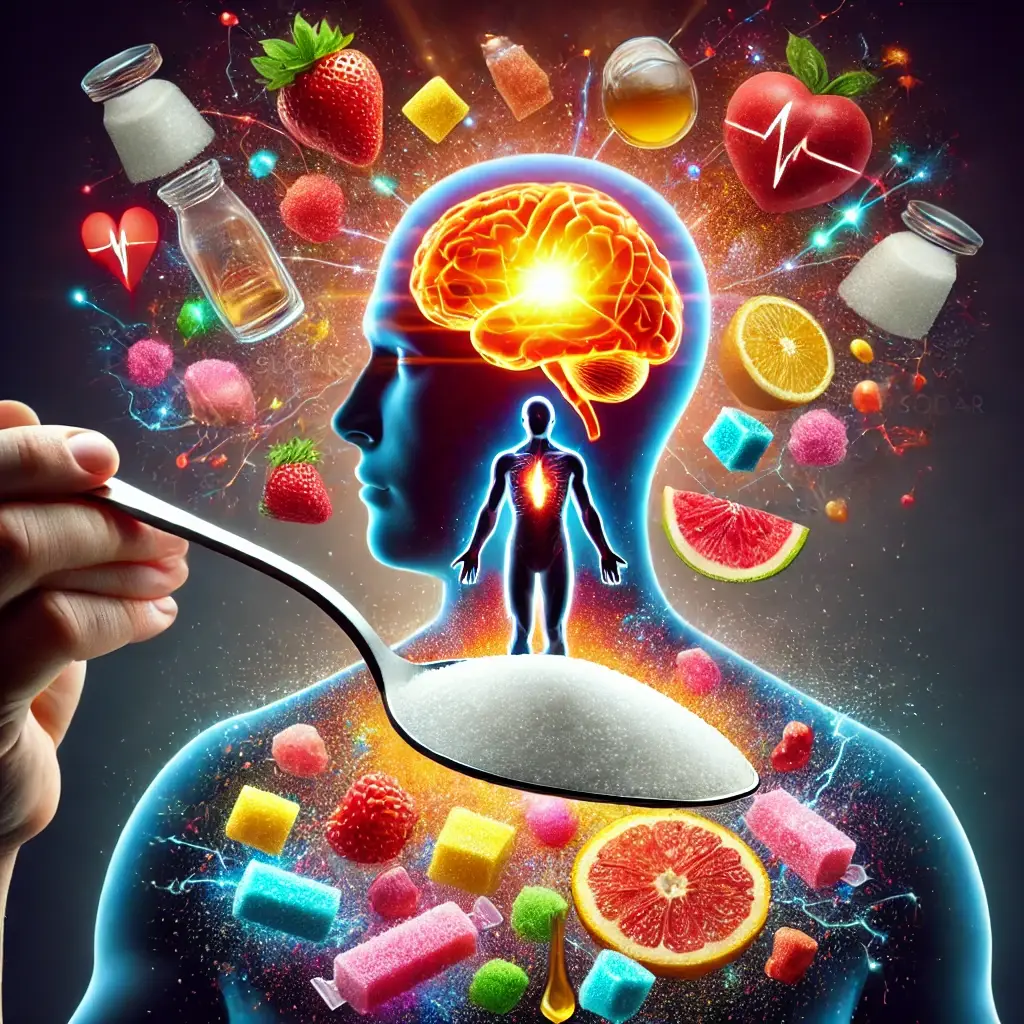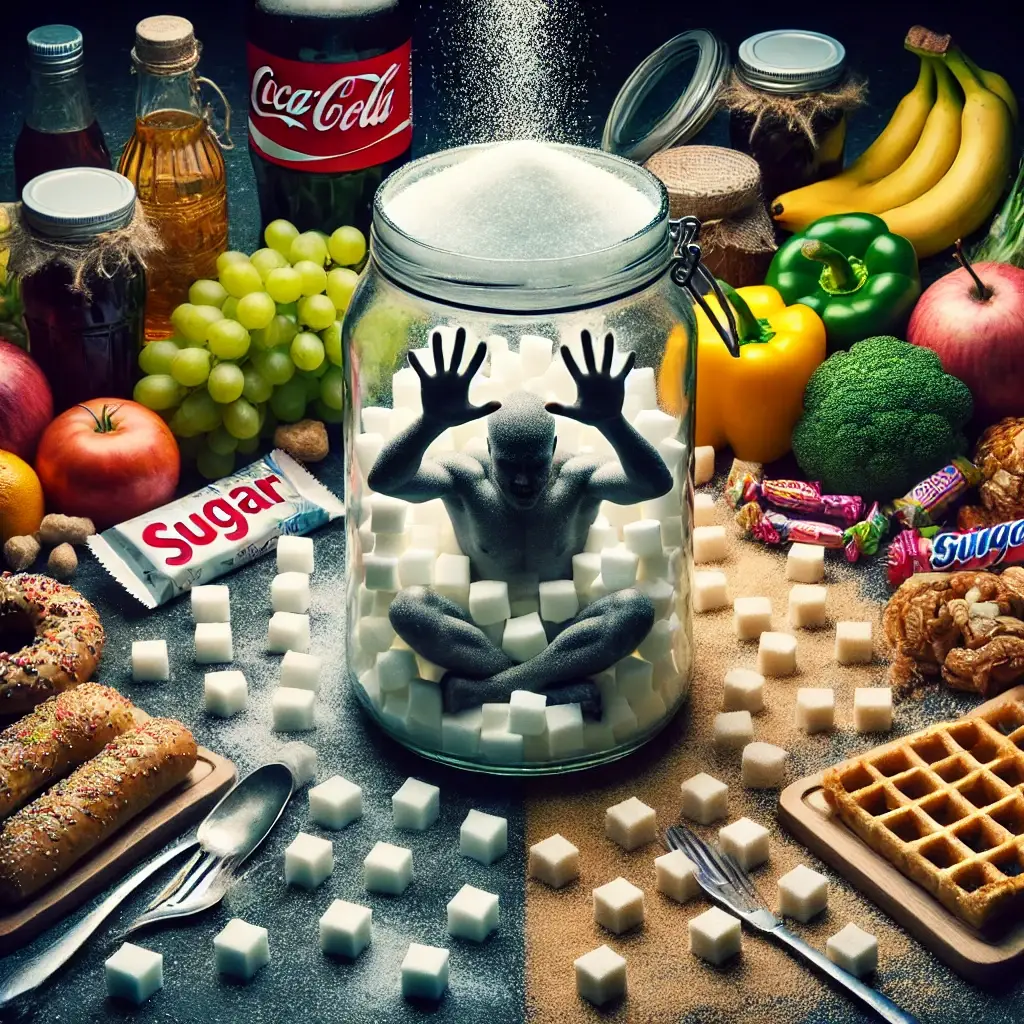
Outline:
- Introduction
- What Is Sugar?
- Natural vs. Added Sugars
- How Sugar Affects Your Body
- Immediate Effects on Energy Levels
- Long-Term Impact on Metabolism
- The Hidden Sources of Sugar in Your Diet
- Processed Foods
- Beverages
- Condiments and Sauces
- The Link Between Sugar and Weight Gain
- Sugar’s Impact on Heart Health
- How Sugar Contributes to Diabetes
- Sugar and Brain Health
- Cognitive Decline
- Risk of Depression and Anxiety
- The Effect of Sugar on Your Skin
- Accelerated Aging
- Acne and Inflammation
- Sugar Addiction: How It Works
- Why Sugar Is as Addictive as Drugs
- How It Hijacks Your Brain
- How to Reduce Sugar in Your Diet
- Reading Food Labels
- Healthy Sugar Alternatives
- The Benefits of Cutting Back on Sugar
- Improved Energy Levels
- Better Sleep
- Enhanced Mood
- Tips for Overcoming Sugar Cravings
- How to Maintain a Low-Sugar Lifestyle
- Conclusion & Final Thoughts
- FAQs
Introduction
Sugar is everywhere! From your morning coffee to your late-night snack, it sneaks into almost every meal you eat. But have you ever stopped to think about what it’s actually doing to your body? The truth about sugar is shocking—it’s one of the biggest threats to your wellness, affecting everything from your weight to your mental health. Let’s dive deep into the impact of sugar on your overall well-being.
What Is Sugar?
Sugar is a type of carbohydrate that your body uses for energy. But not all sugars are created equal.
Natural vs. Added Sugars
- Natural sugars are found in whole foods like fruits, vegetables, and dairy products. They come with fiber and nutrients that help your body process them more effectively.
- Added sugars are those that are artificially included in processed foods and drinks. These have no nutritional value and can be harmful to your health.
How Sugar Affects Your Body
Immediate Effects on Energy Levels
Ever feel an energy spike after eating something sugary, only to crash an hour later? That’s because sugar causes a quick rise in blood sugar levels, followed by a rapid drop, leaving you feeling tired and sluggish.
Long-Term Impact on Metabolism
Excess sugar can slow down your metabolism, making it harder for your body to burn calories efficiently. This can lead to weight gain and other health problems over time.
The Hidden Sources of Sugar in Your Diet
Many people think they’re consuming little sugar, but it’s hiding in unexpected places:
- Processed Foods – Breakfast cereals, granola bars, and flavored yogurts often contain high amounts of added sugar.
- Beverages – Sodas, energy drinks, fruit juices, and even some teas can have more sugar than a candy bar.
- Condiments and Sauces – Ketchup, salad dressings, and pasta sauces often contain hidden sugars.
The Link Between Sugar and Weight Gain
Sugar contributes to weight gain by increasing calorie intake without providing real nutrition. It also interferes with hormones that regulate hunger, making you eat more than you need.
Sugar’s Impact on Heart Health
Studies show that a high-sugar diet increases the risk of heart disease by raising blood pressure, increasing triglycerides, and promoting inflammation.
How Sugar Contributes to Diabetes
Excess sugar consumption can lead to insulin resistance, which is a key factor in type 2 diabetes. Over time, the body struggles to regulate blood sugar levels, increasing disease risk.
Sugar and Brain Health
Cognitive Decline
High sugar intake has been linked to memory problems and an increased risk of Alzheimer’s disease.
Risk of Depression and Anxiety
Sugar affects brain function and mood, leading to increased anxiety and depression symptoms.
The Effect of Sugar on Your Skin
Accelerated Aging
Sugar damages collagen and elastin in your skin, leading to wrinkles and sagging.
Acne and Inflammation
Diets high in sugar trigger inflammation, which can cause breakouts and other skin issues.
Sugar Addiction: How It Works
Why Sugar Is as Addictive as Drugs
Sugar triggers the same reward pathways in the brain as addictive substances like nicotine and cocaine.
How It Hijacks Your Brain
It creates cravings, leading to a cycle of overeating and dependence.
How to Reduce Sugar in Your Diet
Reading Food Labels
Look for hidden sugars in ingredient lists under names like sucrose, high-fructose corn syrup, and dextrose.
Healthy Sugar Alternatives
Opt for natural sweeteners like honey, stevia, or monk fruit instead of processed sugar.
The Benefits of Cutting Back on Sugar
- Improved Energy Levels – No more sugar crashes.
- Better Sleep – Sugar disrupts sleep patterns, so reducing it helps.
- Enhanced Mood – A stable blood sugar level leads to a better mood.
Tips for Overcoming Sugar Cravings
- Stay hydrated
- Eat protein-rich snacks
- Choose whole fruits instead of sugary desserts
How to Maintain a Low-Sugar Lifestyle
- Cook at home more often
- Be mindful of portion sizes
- Find sugar-free substitutes for your favorite treats
Conclusion & Final Thoughts
The shocking truth is that sugar is harming your body in more ways than one. From weight gain to heart disease and even brain health, its effects are widespread. Cutting back on sugar can lead to a healthier, happier life. Start by making small changes today!
FAQs
1. How much sugar is safe to consume daily?
The American Heart Association recommends no more than 6 teaspoons (25g) for women and 9 teaspoons (36g) for men per day.
2. What are the first signs of too much sugar intake?
Fatigue, mood swings, acne, weight gain, and sugar cravings are common signs.
3. Are artificial sweeteners better than sugar?
Not always! Some artificial sweeteners can have negative effects, so natural options like honey or stevia are better.
4. Can quitting sugar help with weight loss?
Yes! Cutting sugar reduces calorie intake and stabilizes metabolism, aiding weight loss.
5. What’s the best way to start reducing sugar?
Start by reading food labels, replacing sugary drinks, and choosing whole foods over processed ones.
🚀 Let’s Connect!
Looking for expert insights on website development, SEO, and online business growth? Connect with me on LinkedIn or reach out via my website!
🔗 Connect on LinkedIn 📩 Contact Me



